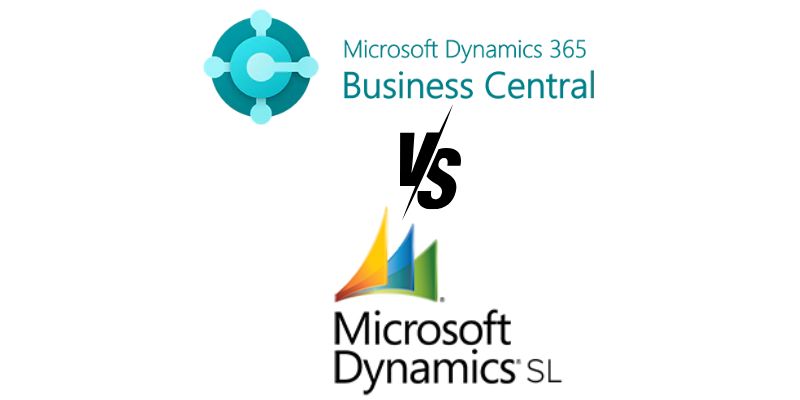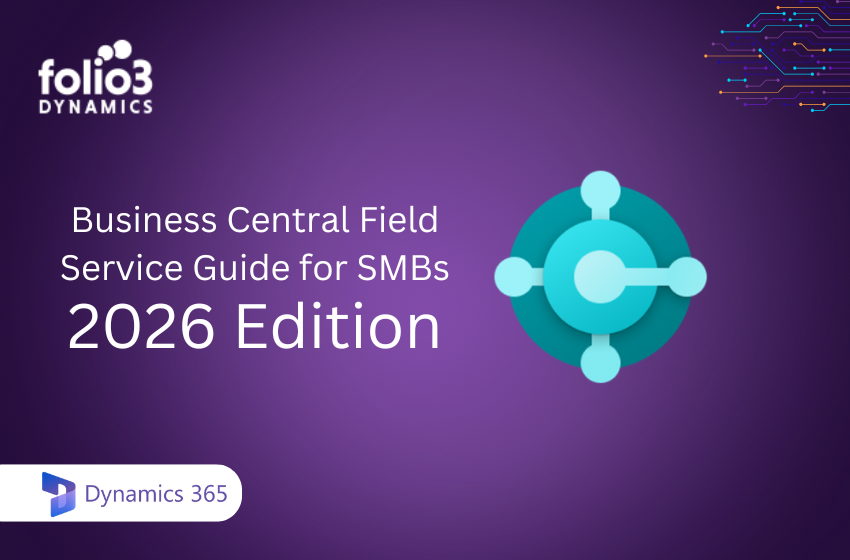Choosing the right ERP system for your business is a crucial decision that can make or break you! It can also be overwhelming. You must select from two popular Microsoft solutions: Microsoft Dynamics SL and Dynamics 365 Business Central.
Both offer strong capabilities to simplify, organize, and optimize business processes but differ in features, pricing, and overall functionality. This Dynamics SL vs. Dynamics 365 Business Central comparison will help you weigh these differences to make an educated choice for your organization.
This blog will discuss the difference between Dynamics SL and Dynamics 365 Business Central, comparing their features, pricing, and benefits. You’ll know which ERP solution fits your business’s unique needs. Let’s get started.
Microsoft Dynamics SL Vs. Dynamics 365 Business Central – Quick Comparison

To make your decision even more accessible, here’s a quick comparison table showcasing the critical differences between Dynamics SL and Dynamics 365 Business Central. This comparison will give you a simultaneous look at their core features, benefits, and pricing.
|
Feature |
Microsoft Dynamics SL |
Dynamics 365 Business Central |
| Target Market |
Primarily designed for project-driven businesses |
Small to mid-sized businesses across industries |
| Deployment |
On-premise |
Cloud-based and On-premise options are available |
| Core Functionality |
Strong project accounting and job costing |
Comprehensive financial, supply chain, and sales management |
| User Experience |
Classic, more traditional interface |
Modern, intuitive, and user-friendly interface |
| Mobile Access |
Limited mobile functionality |
Full mobile functionality with apps available |
| Pricing |
Typically lower upfront cost but can increase with add-ons |
Flexible pricing with the subscription model, more scalable |
| Integration with other Systems |
Limited integration options |
Extensive integration with Microsoft and third-party systems |
| AI and Automation |
Basic automation capabilities |
Advanced AI, automation, and machine learning capabilities |
| Updates and Upgrades |
Requires manual updates |
Automatic cloud updates, ensuring the latest features |
What Is Dynamics 365 Business Central?
Dynamics 365 Business Central is a comprehensive cloud-based ERP solution that manages all core business functions. It offers finance, operations, sales, and customer service features, making it perfect for businesses searching for an all-encompassing solution.
One of Dynamics 365 Business Central’s standout features is its easy integration with other Microsoft products, including Office 365, Power BI, and Teams. This smooth integration provides better collaboration and reporting capabilities, empowering your team to make data-driven decisions.
In addition, Business Central uses artificial intelligence (AI) to automate workflows and provide valuable insights into your operations, which can massively boost productivity and profitability.
Cloud-based deployment makes Dynamics 365 Business Central a highly flexible and scalable ERP solution. This is ideal for businesses that want to stay agile and grow without the limitations due to traditional, on-premise systems.
Benefits of Dynamics 365 Business Central
- Unified Solution: Dynamics 365 Business Central allows you to manage your entire business from one platform. There is no need for separate systems to track finance, operations, or sales.
- Cloud-Based Access: Cloud deployment allows your team to access critical data anytime, anywhere, and from any device. This high flexibility can help businesses support remote teams and stay productive outside the office.
- Customization and Flexibility: With hundreds of customizable features and extensions, you can personalize Business Central according to your business’s needs. Whether you need industry-specific tools or unique processes, Business Central can accommodate them.
- AI and Automation: Utilize AI to automate tasks, spot trends, and improve decision-making. For example, AI-powered forecasting can help predict sales trends or automate inventory restocks.
- Scalability: As your business grows, so can Business Central. You can easily add new users or features without disturbing your current operations.
What Is Microsoft Dynamics SL?
Microsoft Dynamics SL is a solid ERP solution primarily focusing on project-based businesses such as construction, professional services, and government contracting. It shines in project accounting, job costing, and managing complex project workflows. Although Dynamics SL features are more limited in certain areas than Business Central, they provide a trustable solution for businesses that need deep project management capabilities.
For example, Dynamics SL benefits are highly valued by businesses that need to monitor project budgets, expenses, and time-sensitive deliverables closely. The platform enables users to integrate financial tracking and reporting with project management tasks, providing a transparent view of project performance and profitability.
Moreover, Dynamics SL is well-known for its job-costing capabilities. It is a good choice for companies in industries like construction or services that need accurate cost tracking and allocation in multiple projects. However, this functionality comes at the cost of flexibility and innovation, which might become limiting as businesses expand or adopt more digital strategies.
While Dynamics SL pricing may seem more affordable initially, maintaining and upgrading the system can result in higher total costs over time due to the need for frequent system patches and manual updates.
Benefits of Microsoft Dynamics SL
- Project Management Focus: If your business runs large, complex projects, Dynamics SL can benefit you due to its specialized project accounting, budgeting, and forecasting features. It strongly supports managing project timelines, costs, and labor tracking for construction-related industries.
- In-Depth Reporting: Get detailed project reports and financial tracking to help manage costs and timelines. This high level of detail is a must for project-driven industries.
- Established Solution: It is a trusted ERP solution for industries like construction and government contracting, with years of proven success. Its long track record means it’s a solid choice for specific traditional industries.
- Integration with Microsoft Products: Although Dynamics SL features may be more limited than Business Central, it integrates easily with Microsoft Office tools and specific Microsoft software, helping increase functionality and optimize operations.
Why Migrate From Dynamics SL to Dynamics 365 Business Central?
If you’re currently using Dynamics SL, you might wonder if it’s time to migrate to a more modern solution. The benefits of migrating from Dynamics SL to Dynamics 365 Business Central are noteworthy. Here’s why many businesses are making the switch:
1. Advanced Functionality
While Dynamics SL features are strong, Business Central offers broader functionality, including advanced financials, sales, and operations capabilities. Dynamics 365 Business Central benefits have a holistic approach to business management, helping companies simplify and streamline their workflows and gain insights into all departments within a single platform.
With Dynamics 365 Business Central, you can access complete modules for inventory management, supply chain optimization, and customer relationship management. This makes it more suitable for growing businesses that require more than just project management.
2. Enhanced User Experiences
Business Central outshines because of its modern, user-friendly interface, which makes navigating complex workflows and processes much more accessible than Dynamics SL’s traditional interface. Your team will find it easier to adapt to Business Central’s intuitive design, which cuts down on training time and increases user adoption.
3. Modern Cloud Technology
Dynamics 365 Business Central is cloud-based, offering significant advantages over Dynamics SL’s on-premise deployment. Cloud technology provides automatic updates, mobile access, and the flexibility to work from anywhere, which are essential for a business to function in today’s dynamic world.
Cloud deployment means your business is always running on the latest software version, with security updates and patches handled automatically. This rids the need for IT teams to manually install updates and allows businesses to focus more on their operations.
4. Future-Proofing
With Dynamics 365 Business Central, you’re investing in a solution that will adapt to your business. Automatic updates and new features mean you won’t need to worry about outdated software, as you would with Dynamics SL. This helps secure your future with your investment in an ERP system.
Moreover, Business Central’s integration with other Microsoft tools, such as Power BI and Azure, increases its capabilities, making it an advanced choice for businesses that want to stay competitive in an ever-changing market.
5. Access to AI Capabilities
AI and machine learning are integrated into Dynamics 365 Business Central, providing beneficial features like predictive analytics, automated workflows, and personalized insights. These can help businesses improve efficiency and customer satisfaction.
Dynamics SL, on the other hand, is behind in such advanced AI capabilities. Although it offers good project management functionality, its lack of AI means businesses are missing out on cutting-edge tools that can help improve decision-making and operations.
6. Eliminate Reliance on Legacy Infrastructure
Dynamics SL often needs businesses to manage legacy infrastructure, which can be costly and time-consuming. By moving to Dynamics 365 Business Central, you can eliminate your reliability on outdated systems and shift to a modern, cloud-based environment that’s more efficient and scalable.
Cloud solutions like Dynamics 365 Business Central help businesses reduce IT costs by eliminating the need to manage on-premise infrastructure. This approach lowers maintenance costs and improves overall operational efficiency, letting your team focus on growth.
Conclusion
When debating between Dynamics SL vs Dynamics 365 Business Central, the choice solely depends on your business needs. For project-based businesses with complex job costing, Dynamics SL is a good option.
However, for those looking for an advanced, scalable ERP with advanced finance, operations, and sales features, Dynamics 365 Business Central is the best choice. Its cloud-based deployment, AI-powered tools, and easy integration with Microsoft products make it perfect for businesses that want to streamline operations and warrant the long-term success of their systems.
Hence, if you’re ready to migrate or need expert guidance, Folio3 can help you transition smoothly to Dynamics 365 Business Central. At Folio3, we specialize in integrating and customizing Business Central to cater to your unique needs.


